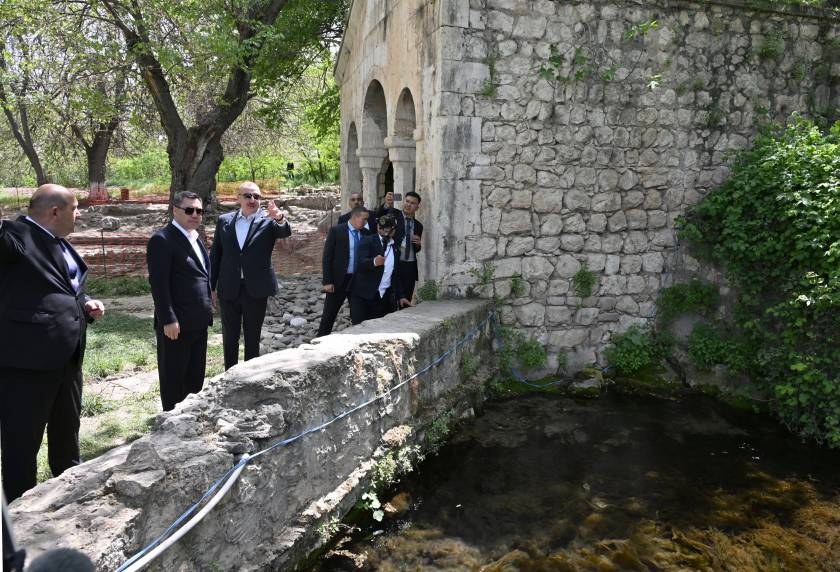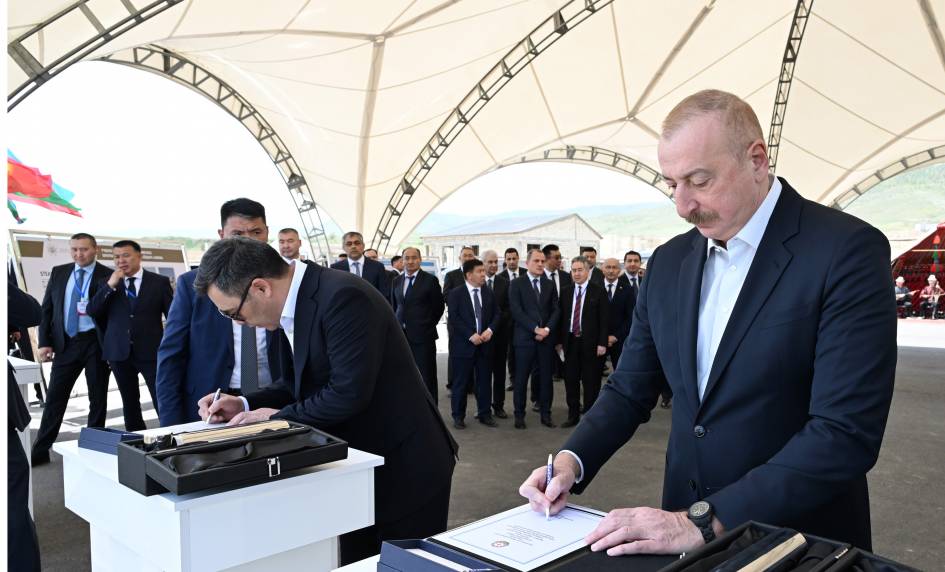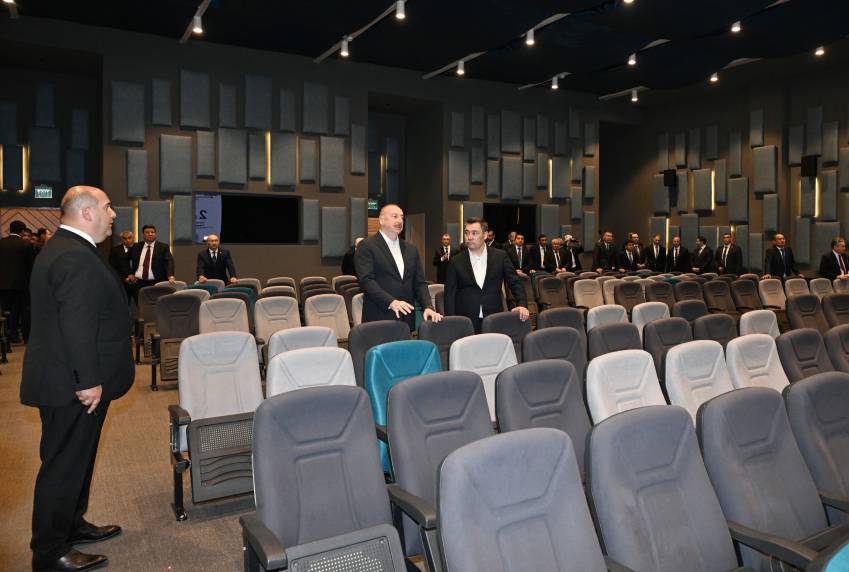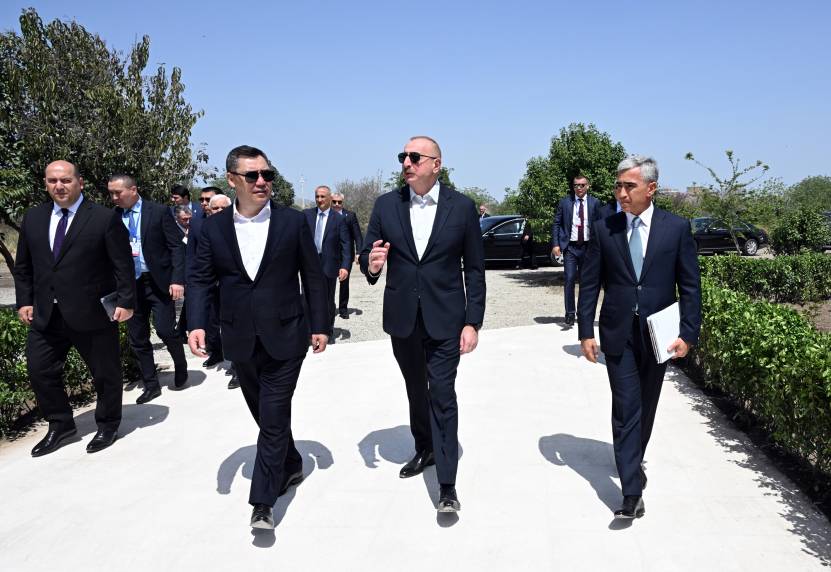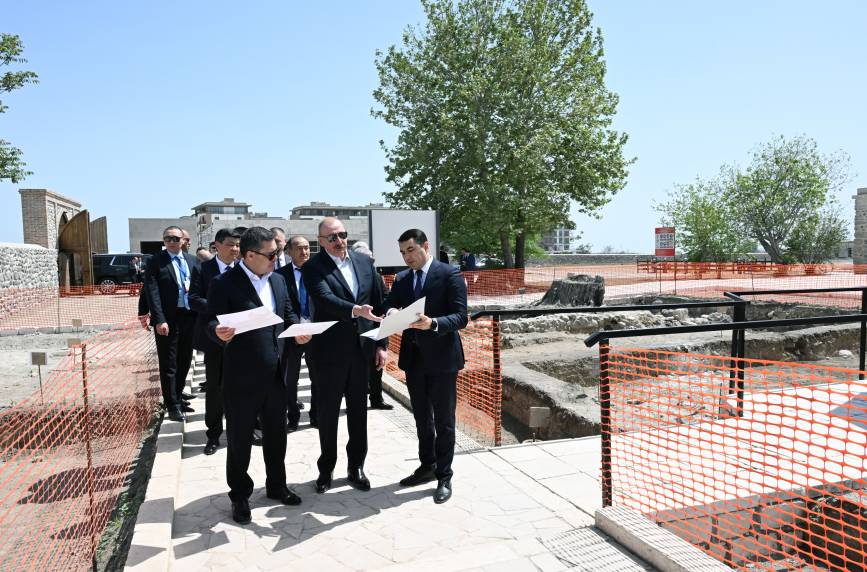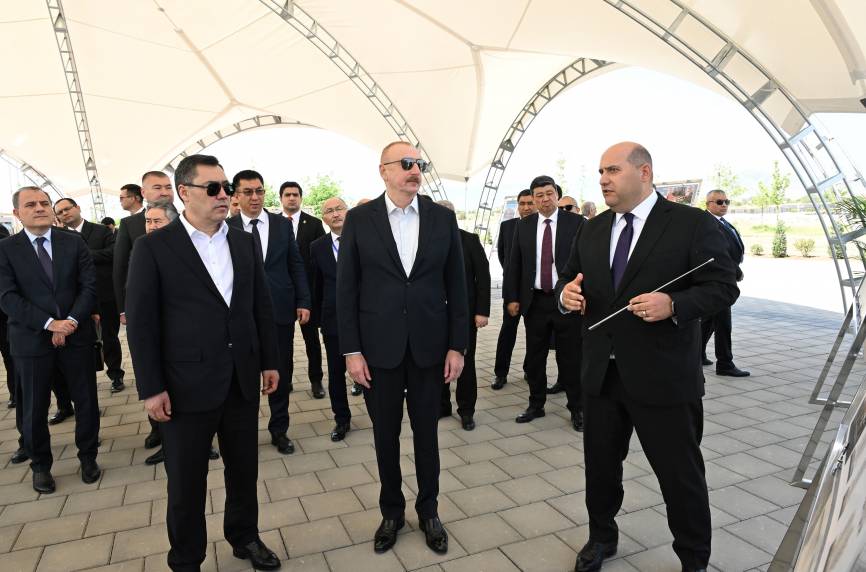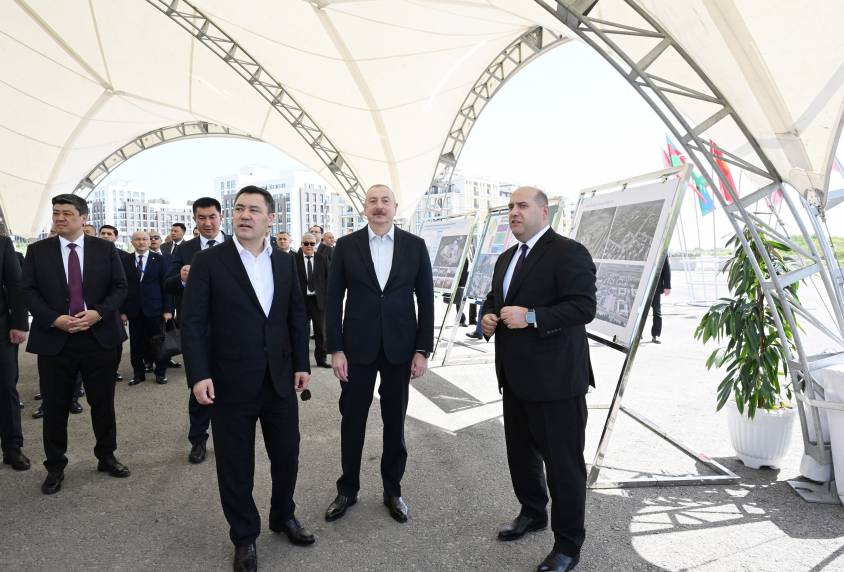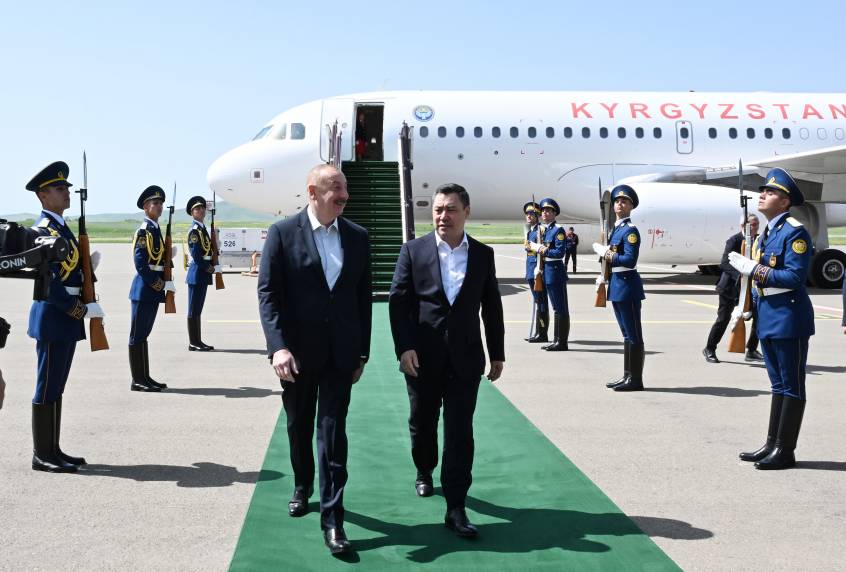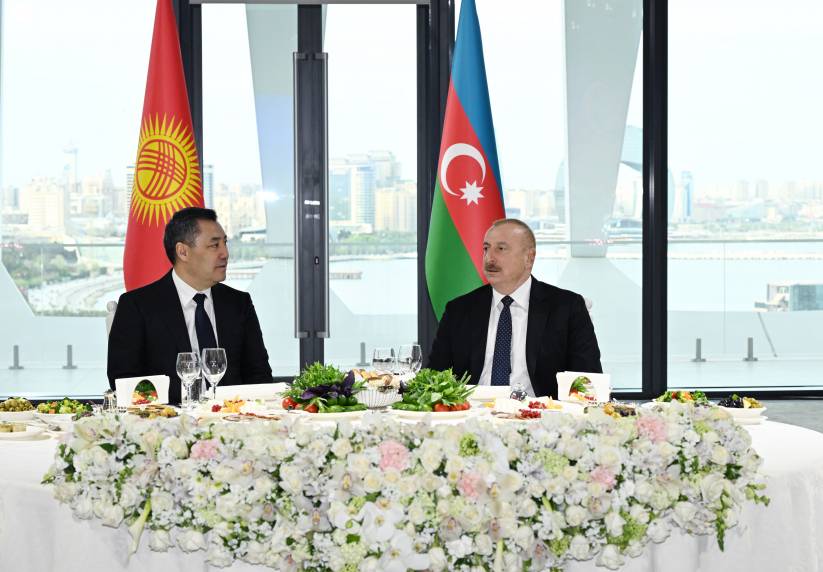16:25
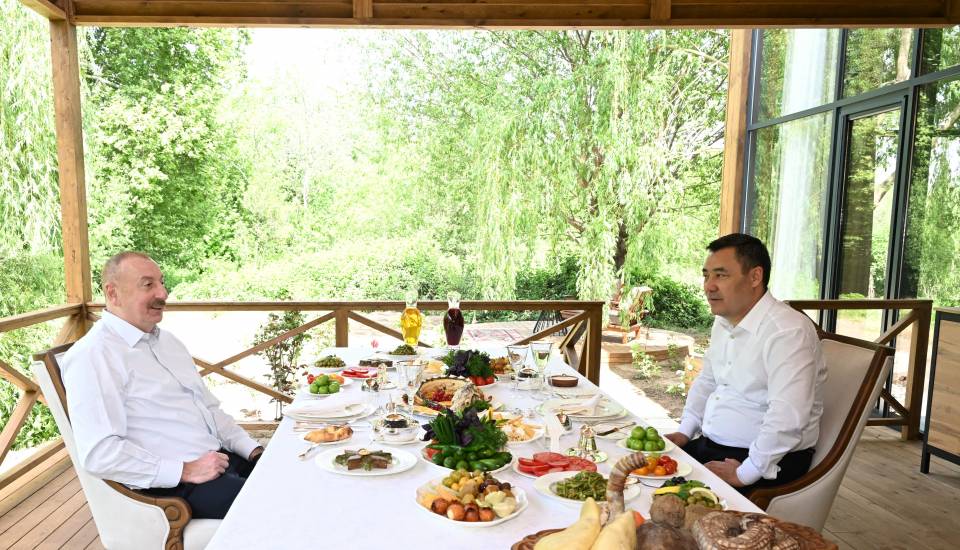
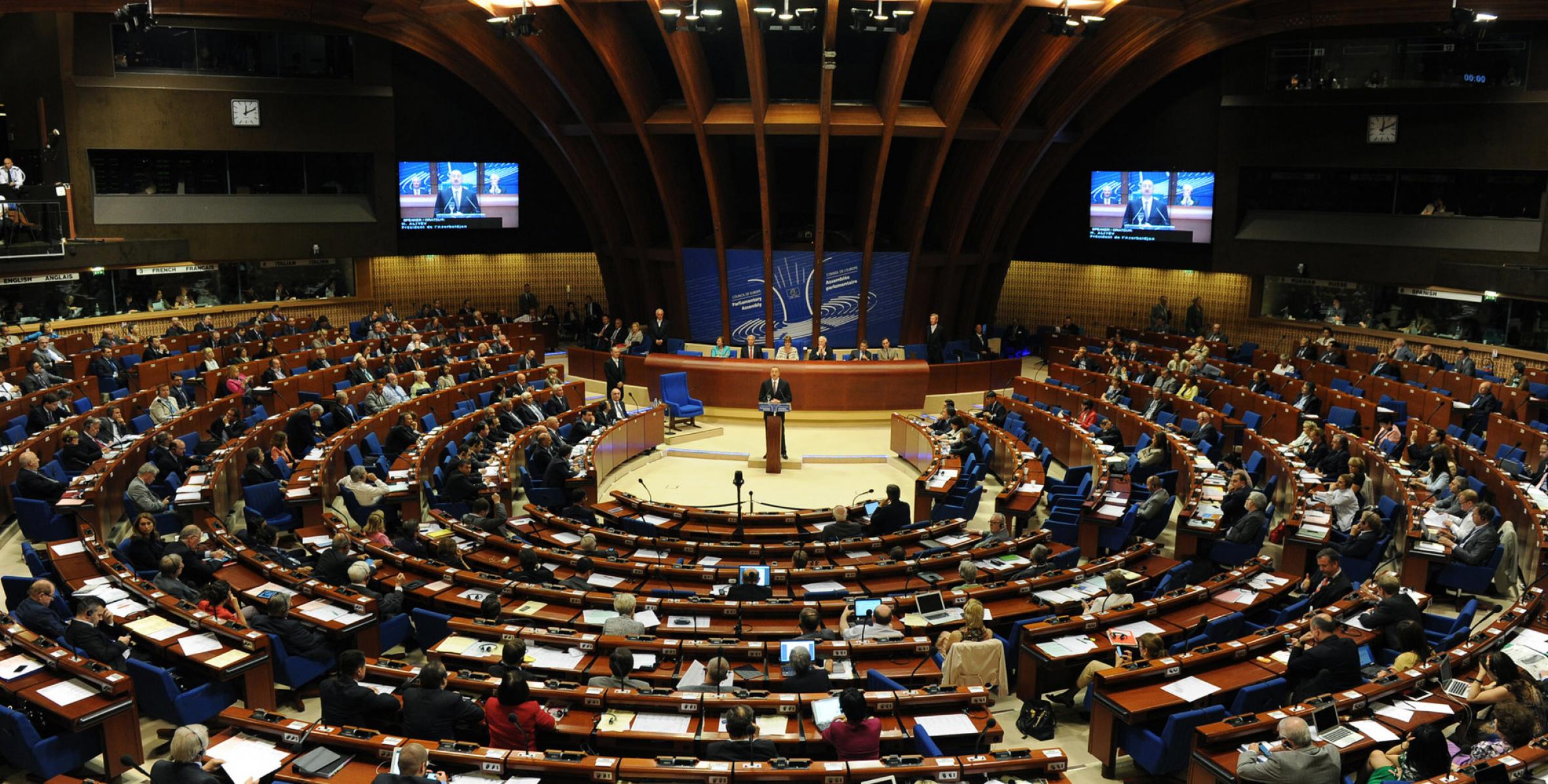
- Madam President, ladies and gentlemen, first, I thank the President for the invitation. It is a great honour and pleasure to come back to Strasbourg. I am also very grateful to the President for quoting my speech, which I delivered here 10 years ago.
I can only confirm that what I said then is our position with respect to reforms. The successful development of Azerbaijan during the years of independence shows that economic and political reforms, if implemented in parallel, lead to success.
The reforms in Azerbaijan show that when implemented in parallel they can lead to substantial progress. The years of Azerbaijan’s membership of the Council of Europe have been years of very rapid economic and political transformation.
Reforms in Azerbaijan started in the mid-1990s, some years after the restoration of our independence. The first years of independence were marked by enormous complications and tragedy for our people. There was social unrest, economic complications and difficulties, political, economic and military crises, and inefficient government from the previous leadership of Azerbaijan. That all led to a very serious situation, with even our statehood being put in question. As a result of that situation, we had civil war in Azerbaijan in 1993, which was the most tragic part of our modern history.
The reforms started in the mid-1990s. The new democratic constitution of Azerbaijan was adopted. The economic and political reforms have been conducted in parallel, which has led to the substantial progress that our country has achieved since independence.
Joining the Council of Europe was a conscious choice. We wanted to be a member of this institution and to deepen our reforms. We knew that joining the Council of Europe entailed commitments. We were ready to make those commitments. We have implemented our commitments and obligations. As Madam President said, we have joined almost 60 conventions. We have upgraded our legislation. The reforms that we have implemented have created a very positive atmosphere in our society.
All the fundamental freedoms are provided in Azerbaijan. We have freedom of political activity. There are hundreds of political institutions and parties. We have freedom of expression and media freedom. There are more than 40 daily and almost 200 weekly or monthly newspapers. There are nine countrywide TV channels, 14 regional channels and 14 cable TV channels. We have free Internet and more than 70% of people in Azerbaijan use it. The government is implementing a project to bring broadband Internet to every city and village, which demands large investment.
As we have free Internet and no censorship, we cannot restrict media freedom. On the contrary, we are in favour of media freedom because it means democracy – it helps the government to concentrate on shortcomings and creates a necessary link between the government and society. Media freedom is one of the biggest assets of modern Azerbaijan, and we are proud of that. I say once again that media freedom is fully provided.
Freedom of association and assembly is also fully provided in Azerbaijan. The political institutions take advantage of that and, from time to time, hold rallies in a peaceful atmosphere. That shows our commitment to reform.
The implementation of the reforms is a priority for us not because we need to implement commitments or get a positive assessment from international institutions, but because we are modernising our country. As I said 10 years ago, without strong democratic institutions, our economic success will not be sustainable. The economic and political reforms that are running in parallel and the democratisation of our society have created a positive atmosphere in our society.
Religious freedom is another of our country’s biggest assets. We are a multi-ethnic and multi-religious society. For centuries, the representatives of different nationalities and religions have lived in peace and dignity in Azerbaijan. Concentrating on the values of multiculturalism will be one of the priorities of our chairmanship.
Azerbaijan initiated the Baku process, which started in 2008. We invited the ministers of culture from the countries of the Council of Europe to meet the ministers of culture from the countries of the Organization of Islamic Cooperation in Baku. It was the first time in history that representatives of those two important international institutions had got together. Vice versa, in 2009, we invited ministers from the countries of the Council of Europe to participate in an Islamic conference summit in Baku.
Multiculturalism is therefore one of our big advantages and one of our big assets. We will definitely concentrate on it during our chairmanship, because there is a great need for it. Unfortunately, we are seeing tendencies in our neighbourhood, in the Middle East and in Europe that are of concern – the tendencies of alienation, separation and sometimes even hatred. We need to address that issue because we live in this world and must contribute to making it a better world for everyone – for people of all religions. People must be able to live in dignity and peace, regardless of their standard of living. Therefore, tensions that are based on religious sentiments are very dangerous for every country, including societies that have a multinational component.
Another priority will be to concentrate on the implementation of the resolutions and decisions of international organisations.
As far as we are concerned, several important resolutions and decisions have been adopted by the United Nations Security Council, the Parliamentary Assembly of the Council of Europe, the European Parliament and the OSCE with regard to the conflict between Armenia and Azerbaijan, but none of them have been implemented. There should be a mechanism for the implementation of resolutions that are adopted by prominent international institutions. That mechanism must be followed by all of us, otherwise the resolutions will lose their substance.
We will advocate strongly for the superiority of the norms and principles of international law. I am very grateful to Madam President for the comments that she made in her introductory remarks about the territorial integrity of Azerbaijan. That is a fundamental principle of international law and the main principle that must be observed in resolving the protracted conflicts.
Our Foreign Minister elaborated on our other priorities when he addressed the Assembly yesterday, so I will not go into much detail, but will just name them. The fight against corruption will be one priority. Azerbaijan has unique experience in that area.
Unfortunately, all the former republics of the Soviet Union have the same problem: the legacy of corruption seriously damages the successful development of our countries. Azerbaijan has implemented numerous measures, including administrative and institutional reforms, to combat corruption and we have had great success. One such measure is the relatively newly established public services programme, which has existed for one and a half years. Already, almost 2 million people have applied to these centres and received the necessary documents. That has seriously reduced the level of corruption in Azerbaijan. During his visit to Azerbaijan, the Secretary General of the Council of Europe visited one of the centres. It will be interesting for other member states to hear about that experience.
Youth and education are a top priority in our domestic policy. We have a young, dynamic and educated society. The level of literacy in Azerbaijan is close to 100%. We understand that an educated society is the only guarantee of successful development, and that it can be a guarantee against radicalism and fundamentalism. Education is therefore one of the top priorities for our government. Over the past 10 years, more than 300 schools have been built in Azerbaijan and the quality of education is improving. At the same time, we have implemented numerous programmes in collaboration with the leading universities of the world. We are sending our young students to train abroad so that our intellectual potential is in line with our economic potential. Those are the main priorities that we will concentrate on during our chairmanship.
Our chairmanship is an important milestone in the history of our membership of the Council of Europe. Of course, the chairmanship is based on the principle of rotation and it is just that our turn has come. At the same time, it is a good chance for us to present our country and to address important issues of concern in different European countries, such as those to do with democracy, the rule of law and sometimes selective policy approaches to similar situations in different countries.
During our chairmanship, we will definitely be raising the sometimes differentiated approach to countries in the same region.
Refusal of such principles of double standards will therefore be a great contribution, if we succeed in our chairmanship.
As far as the general development of Azerbaijan is concerned, our country is young, but with great history and traditions and much dynamism. It has an active foreign policy and plays a stabilising role in the region. The potential of Azerbaijan is growing and our initiatives in regional co-operation are supported by our neighbours. Furthermore, our neighbourhood is growing, so initiatives that we launch now cover many more countries.
We have strong support from the international community and a positive reputation in international institutions. Our greatest diplomatic success was the election of Azerbaijan as a non-permanent member of the United Nations Security Council. For a young country which still needs to present itself to the world, that was the biggest achievement; we are proud of that. We are also proud that 155 countries supported our candidacy – an absolute majority of the international community therefore trusts and supports Azerbaijan and considers it a reliable partner. In the two years of our membership, we twice chaired the Security Council. Our chairmanship and membership were overwhelmingly assessed as very successful. We contributed significantly to peace, security, stability and predictability in the world. Membership of the Security Council was a unique experience for our country, which we will of course use in future initiatives.
We have established constructive relationships with an absolute majority of the international community and our bilateral ties with European countries are developing successfully. Europe is our main trading partner, with historic links between Azerbaijan and Europe strengthened during the years of independence. At the same time, Azerbaijan is a Muslim country and an active member of the Organisation of Islamic Co-operation. We play an important role not only geographically, but as a cultural and political bridge in our region. The more successful we are, the more active role we can play in the interaction between civilisations, as shown by the International Forum on the Dialogue among Civilisations in Baku. Azerbaijan is a world centre of multiculturalism, and an international centre of multiculturalism will soon be created in our country.
The biggest of the problems that we face is the violation of our internationally recognised territory – the territorial integrity of Azerbaijan. The conflict between Armenia and Azerbaijan puts the whole region in danger. It is called a “frozen” or “protracted” conflict, but neither is it frozen nor can it be frozen, because it must be resolved. Nagorno-Karabakh is an historic part of Azerbaijan; Azerbaijanis lived in Nagorno-Karabakh for centuries and Armenians settled in the area less than 200 years ago, but historic monuments and our heritage in Nagorno-Karabakh have now unfortunately been destroyed by the occupying Armenian army. The conflict resulted in the occupation of 20% of the internationally recognised territory of Azerbaijan.
Azerbaijanis were the subject of ethnic cleansing by Armenian gangs and the Armenian army and one million Azerbaijanis became refugees and internally displaced persons in Azerbaijan. Nagorno-Karabakh and seven districts around it have been under occupation for more than 20 years. That is the biggest injustice.
As I said, Nagorno-Karabakh is an historic part of Azerbaijan. Even the word “Karabakh” is of Azerbaijani origin and, in fact, all the geographic toponyms of that area belong to our people.
According to the norms of international law, Nagorno-Karabakh is an integral part of Azerbaijan. The whole world recognises Nagorno-Karabakh as part of Azerbaijan and no one, including Armenia, recognises Nagorno-Karabakh and its illegal regime as an independent entity. The United Nations Security Council, the world’s highest international body, has adopted four resolutions demanding unconditional and immediate withdrawal of Armenian forces from the occupied territories. As I said, those resolutions unfortunately have not been implemented. Again, we have a policy of double standards. Some UN resolutions are implemented within hours, but in our case it has been more than 20 years. There is no mechanism to deal with the situation and Armenia simply does not want to liberate any territories. It does not want to leave occupied territory; it wants everything unchanged and to keep the status quo. That is in total contradiction to the efforts of the international mediators, the OSCE Minsk Group and its co-chairs. The Presidents of the United States, Russia and France, three permanent members of the UN Security Council, have on a couple of occasions made clear statements that the status quo is not acceptable, which means that Armenia should start withdrawing its occupying forces from occupied territory. The Armenians, however, simply ignore international law, statements from leading countries of the world and the resolution of the Parliamentary Assembly of the Council of Europe, which was adopted in 2005. A corresponding resolution has been adopted by the European Parliament, and it and the decisions of the OSCE all demand de-occupation and the withdrawal of Armenian troops from occupied territories. Unfortunately, however, the conflict has not been resolved. Azerbaijan behaves very constructively. For more than 20 years, we have been committed to the negotiation process. Everyone, including the Armenians, should understand, however, that something might happen, so the sooner that the Armenian leadership recognises that it is unacceptable in the 21st century to occupy the territory of other countries, the better. Unfortunately, the approach of the Armenian leadership is not adequate.
The previous President of Armenia, speaking here in this home of democracy, said that there is a national incompatibility between Armenians and Azerbaijanis. His successor, the current leader of Armenia, describes the conflict as a religious one.
That approach is absolutely unacceptable. Azerbaijanis have no incompatibility with any nation – Armenians might do so, but not only with us, because their country is now mono-ethnic, with 99.9% of the population of Armenia being Armenians. All the minorities, including Azerbaijanis, were forced to leave. That racist approach cannot prevail in negotiation. We need to address the issue and to restore justice and the territorial integrity of Azerbaijan.
Unfortunately, as a result of the occupation, our historic monuments are destroyed, our mosques have been levelled to the ground, our cemeteries destroyed, and today’s occupied territory is a land totally destroyed. The OSCE twice sent missions – fact-finding and field assistance missions – to the occupied territories. Its report clearly shows that everything is destroyed.
That is a result of Armenian vandalism in the occupied territories. Territorial integrity is a basic principle of international law.
Self-determination, to which the Armenian side always refers, should not violate the territorial integrity of countries. The Armenian leadership should read the Helsinki Final Act carefully. They would see the clear definition. In addition, Armenians are self-determined. They have an Armenian state, which was created on historically Azerbaijani lands. Perhaps many members of the Assembly do not know – the Armenian delegation knows – that one of the first decrees of the Democratic Republic of Azerbaijan, which was created as a result of the collapse of the Russian Empire in 1918, made Yerevan the capital of the Armenian state. Armenians already have a state. How many Armenian states do they want? Do they want to create another state everywhere they live? Why should there be another Armenian state in Azerbaijan? One is enough. Self-determination should not violate territorial integrity, and the conflict must be resolved as soon as possible for the benefit of all of us, including Armenian people, who suffer from today’s Armenian Government, which leads the country towards total collapse and catastrophe.
Despite the conflict, Azerbaijan’s economy is growing. In the past 10 years, Azerbaijan has been the fastest-growing economy in the world. No other country increased its economic potential as much as Azerbaijan did. Our gross domestic product multiplied by 3.4. We managed to diversify the economy. As a result, the non-energy sector is 55% of our GDP. The international and financial institutions highly value our reforms. During the years of financial crisis, the main ratings agencies – Standard and Poor’s, Moody’s and Fitch – upgraded Azerbaijan’s credit rating. The Davos World Economic Forum ranks Azerbaijan’s economy No. 39 in the global competitiveness index. That means that we have managed to transform our planned economy into a market economy to the maximum degree, creating a competitive economy. Some 1.2 million jobs were created in Azerbaijan. The fair distribution of national wealth is one of our country’s main achievements. As a result, the level of poverty dropped in the past 10 years from 49% to 5.3%; unemployment is 5%; the budget deficit is at the limits accepted by European Union countries; and foreign debt is 8% of GDP. The financial situation is stable and social programmes are being implemented. The political situation is stable. As I have said, Azerbaijan is an active member of the international community and the country is modernising. We look to the future with great optimism.
I do not want to take all our time for myself – I want to leave time for questions. As you can imagine, I could talk about our country for several hours, but I do not want to use all the time for my presentation. Chairing the Committee of Ministers is a big challenge and a big responsibility. We are ready for it. We will do our utmost to contribute to the common values of democracy, the rule of law and freedom.

